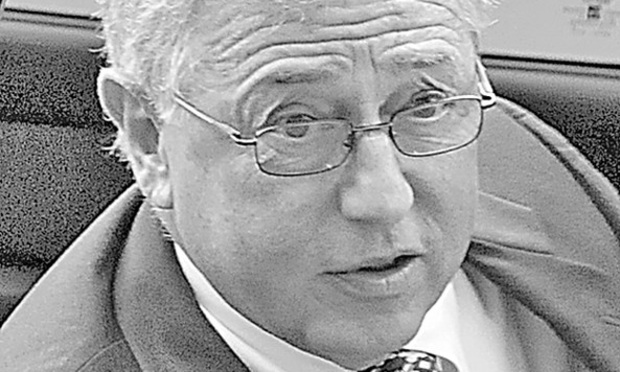3rd Circ. Upholds Grant of New Trial on 'Kids-for-Cash' Judge Ciavarella's Conspiracy Convictions
Judge Thomas Ambro of the U.S. Court of Appeals for the Third Circuit wrote in the court's March 29 opinion that a new trial with McDonnell-specific jury instructions was not warranted.
March 29, 2019 at 04:15 PM
5 minute read
 Mark Ciavarella
Mark Ciavarella
A federal appeals court has ruled that former Luzerne County Court of Common Pleas Judge Mark Ciavarella is entitled to a new trial on three vacated convictions for racketeering, racketeering conspiracy and money laundering conspiracy, but rejected his attempt to rely on precedent set by the U.S. Supreme Court's 2016 ruling in McDonnell v. United States.
Ciavarella was sentenced in 2011 to 27 years' imprisonment for accepting $2.8 million in kickbacks, along with fellow Judge Michael Conahan, from the builder and former co-owner of a private juvenile detention facility.
When Ciavarella initially appealed his sentence to the U.S. Court of Appeals for the Third Circuit, he leveled numerous challenges to the conduct of U.S. District Judge Edwin Kosik of the Middle District of Pennsylvania, who oversaw his trial, and alleged various trial and sentencing errors.
The Third Circuit rejected those arguments—though it did vacate his conviction on one count of mail fraud—and the U.S. Supreme Court ultimately declined to take up his case in 2014.
Ciavarella, however, began pursuing a new avenue of appeal in 2017, filing a habeas petition that sought to rely in part on the U.S. Supreme Court's landmark ruling in McDonnell v. United States. In that case, the high court overturned former Virginia Gov. Robert McDonnell's bribery conviction, narrowing the definition of what constitutes an "official act" done for payment or a favor.
Ciavarella also argued that his trial counsel was ineffective for failing to pursue and preserve a statute of limitations defense with regard to several of the charges against him, including those for racketeering, racketeering conspiracy and money laundering conspiracy.
The U.S. District Court for the Middle District of Pennsylvania vacated Ciavarella's convictions on one count each of racketeering, racketeering conspiracy and money laundering conspiracy, ordering a new trial with a statute of limitations jury instruction to determine whether the racketeering and money laundering conspiracy convictions were based on conduct that fell within the five-year statute of limitations.
"To find Ciavarella guilty of RICO, RICO conspiracy, and money laundering conspiracy in the face of an appropriate statute of limitations instruction, the jury would have to find that the respective conspiracies continued into the limitations period," Middle District Judge Christopher Conner wrote. "In other words, the government would need to establish beyond a reasonable doubt that its September 9, 2009 indictment was 'brought within five years of the last overt act' in furtherance of the conspiracies. If the jury resolved that the conspiracies concluded before September 9, 2004, it would be required to acquit Ciavarella on Counts 1, 2, and 21. The jury‟s verdict constrains us to find that an appropriate limitations instruction may have altered the outcome of these proceedings."
But the trial court rejected the McDowell argument and upheld the remaining convictions.
The Third Circuit affirmed that ruling in full.
Judge Thomas Ambro wrote in the appeals court's March 29 opinion that a new trial with a statute of limitations jury instruction was warranted for the three vacated convictions.
"We cannot say for certain whether the jury believed that the racketeering and money-laundering conspiracies ended before September 2004," Ambro said. "But such a belief seems 'reasonably probable' in light of the jury's acquittal on all kickbacks after 2003."
But Ambro also agreed with the lower court that McDonnell-specific jury instructions were not warranted.
"Ciavarella's counsel failed to preserve this claim by challenging the jury instructions at trial, and Ciavarella cannot provide any reason to excuse this procedural default," Ambro said. "In particular, it is no excuse that he was convicted before McDonnell was decided. Although 'subsequent legal developments have made counsel's task easier,' a McDonnell-style challenge was 'available' at the time of Ciavarella's conviction."
Ambro added, "Second, Ciavarella's bribery-related actions still satisfy even a post-McDonnell understanding of 'official act.' If sentencing hundreds of juvenile offenders to excessive terms of incarceration is not an 'official act,' then nothing is."
The U.S. Attorney's Office for the Middle District of Pennsylvania and Ciavarella's attorney, Jennifer P. Wilson, did not respond to requests for comment.
The McDonnell decision, in which the high court overturned former Virginia Gov. Robert McDonnell's bribery conviction, was handed down while Ciavarella was in his fifth year of federal incarceration.
Chief Justice John Roberts Jr., writing for the court in McDonnell, said the justices were adopting a more "bounded interpretation" of "official acts" than what prosecutors had advocated. The court sent the case back to the trial judge to decide whether there was enough evidence that McDonnell's conduct fell under the new definition of "official acts." If so, the judge could order a new trial. If not, the charges will be dismissed.
The ex-governor, a Republican, was sentenced in 2014 to two years in prison on charges he took "official acts" in exchange for more than $175,000 in gifts and cash from Virginia businessman Jonnie Williams Sr. McDonnell was accused of using his office to promote Williams' company.
"There is no doubt that this case is distasteful; it may be worse than that. But our concern is not with tawdry tales of Ferraris, Rolexes and ball gowns," Roberts wrote. "It is instead with the broader legal implications of the government's boundless interpretation of the federal bribery statute."
Prosecutors' interpretation of official acts was overbroad, the court said.
"Officials might wonder whether they could respond to even the most commonplace requests for assistance, and citizens with legitimate concerns might shrink from participating in democratic discourse," Roberts wrote.
This content has been archived. It is available through our partners, LexisNexis® and Bloomberg Law.
To view this content, please continue to their sites.
Not a Lexis Subscriber?
Subscribe Now
Not a Bloomberg Law Subscriber?
Subscribe Now
NOT FOR REPRINT
© 2025 ALM Global, LLC, All Rights Reserved. Request academic re-use from www.copyright.com. All other uses, submit a request to [email protected]. For more information visit Asset & Logo Licensing.
You Might Like
View All


Stevens & Lee Hires Ex-Middle District of Pennsylvania U.S. Attorney as White-Collar Co-Chair
3 minute read
Judge Tanks Prevailing Pittsburgh Attorneys' $2.45M Fee Request to $250K
5 minute readTrending Stories
Who Got The Work
J. Brugh Lower of Gibbons has entered an appearance for industrial equipment supplier Devco Corporation in a pending trademark infringement lawsuit. The suit, accusing the defendant of selling knock-off Graco products, was filed Dec. 18 in New Jersey District Court by Rivkin Radler on behalf of Graco Inc. and Graco Minnesota. The case, assigned to U.S. District Judge Zahid N. Quraishi, is 3:24-cv-11294, Graco Inc. et al v. Devco Corporation.
Who Got The Work
Rebecca Maller-Stein and Kent A. Yalowitz of Arnold & Porter Kaye Scholer have entered their appearances for Hanaco Venture Capital and its executives, Lior Prosor and David Frankel, in a pending securities lawsuit. The action, filed on Dec. 24 in New York Southern District Court by Zell, Aron & Co. on behalf of Goldeneye Advisors, accuses the defendants of negligently and fraudulently managing the plaintiff's $1 million investment. The case, assigned to U.S. District Judge Vernon S. Broderick, is 1:24-cv-09918, Goldeneye Advisors, LLC v. Hanaco Venture Capital, Ltd. et al.
Who Got The Work
Attorneys from A&O Shearman has stepped in as defense counsel for Toronto-Dominion Bank and other defendants in a pending securities class action. The suit, filed Dec. 11 in New York Southern District Court by Bleichmar Fonti & Auld, accuses the defendants of concealing the bank's 'pervasive' deficiencies in regards to its compliance with the Bank Secrecy Act and the quality of its anti-money laundering controls. The case, assigned to U.S. District Judge Arun Subramanian, is 1:24-cv-09445, Gonzalez v. The Toronto-Dominion Bank et al.
Who Got The Work
Crown Castle International, a Pennsylvania company providing shared communications infrastructure, has turned to Luke D. Wolf of Gordon Rees Scully Mansukhani to fend off a pending breach-of-contract lawsuit. The court action, filed Nov. 25 in Michigan Eastern District Court by Hooper Hathaway PC on behalf of The Town Residences LLC, accuses Crown Castle of failing to transfer approximately $30,000 in utility payments from T-Mobile in breach of a roof-top lease and assignment agreement. The case, assigned to U.S. District Judge Susan K. Declercq, is 2:24-cv-13131, The Town Residences LLC v. T-Mobile US, Inc. et al.
Who Got The Work
Wilfred P. Coronato and Daniel M. Schwartz of McCarter & English have stepped in as defense counsel to Electrolux Home Products Inc. in a pending product liability lawsuit. The court action, filed Nov. 26 in New York Eastern District Court by Poulos Lopiccolo PC and Nagel Rice LLP on behalf of David Stern, alleges that the defendant's refrigerators’ drawers and shelving repeatedly break and fall apart within months after purchase. The case, assigned to U.S. District Judge Joan M. Azrack, is 2:24-cv-08204, Stern v. Electrolux Home Products, Inc.
Featured Firms
Law Offices of Gary Martin Hays & Associates, P.C.
(470) 294-1674
Law Offices of Mark E. Salomone
(857) 444-6468
Smith & Hassler
(713) 739-1250





